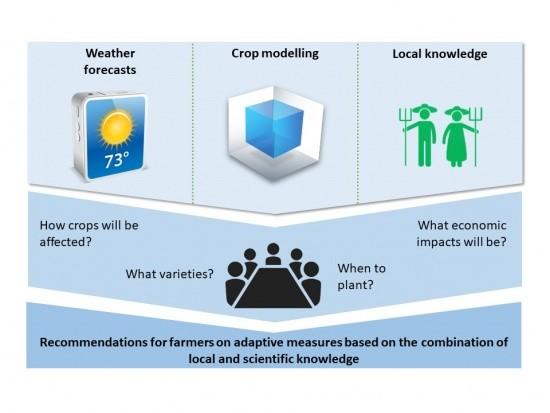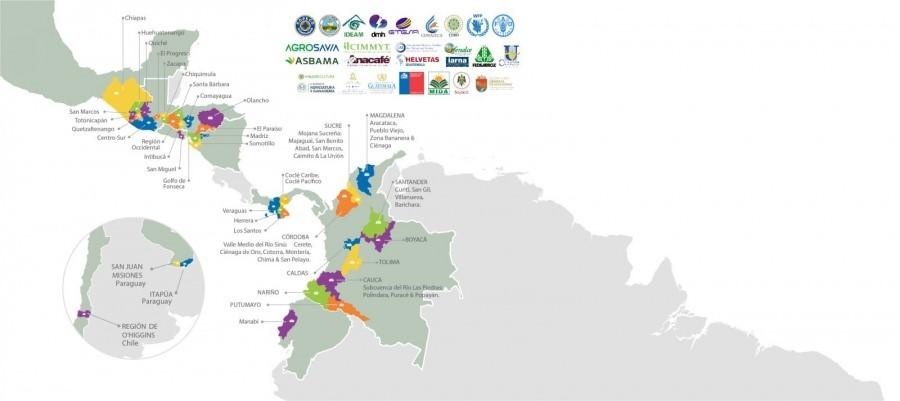The Local Technical Agro-climatic Committees (MTAs, by its acronym in Spanish) is an innovative initiative with the goal of integrating stakeholders from the agricultural sector at the local level to inform smallholder farmers, about the expected changes in the climate of their region, about how they can affect their crops and what they can do to reduce negative impacts.
Moving one or two weeks to the date of sowing can mean that a crop has an outstanding yield, or can avoid losses that seemed imminent. This recommendation comes from an agro-climatic forecast that warns that it is highly likely that the rains will be delayed for at least a week. By moving the planting date, the soil will be more suitable and the crop will be able to receive the amount of water and solar radiation it requires.
MTAs allow discussions between these stakeholders for the management of local agro-climatic information, in order to identify best practices for adaptation to climatic phenomena, which are then transferred to local technicians and producers through the Local Agro-climatic Bulletin. This newsletter summarizes the seasonal predictions and climate forecasts analyzed at the MTA, along with recommendations and climate-smart practices by crop type.
How an MTA works?
During each meeting, experts in agro-meteorology share the agro-climatic forecasts, made from the analysis of seasonal predictions for the region, and crop models. Subsequently, the participants in the committee meet in groups and analyze how crops would be affected, based on the forecasts presented and their own experience to make recommendations that facilitate decision-making on topics such as: what seed to use, more favorable dates for sowing according to the soil moisture accumulated both in the sowing and throughout the cycle, irrigation management, cropping, soil, and insect-pests or diseases according to the climatic conditions foreseen for the following months.

MTA are also spaces that bring together stakeholders to discuss issues related to agricultural activity and climate and serve as vehicles for coordinating activities between institutions. The MTA approach also seeks to strengthen participants' capacities by conducting workshops on agro-climatic modeling tools and empowering members of the committee to appropriate it by alternating roles and tasks among participating organizations.
Scaling up the impact
Latin American farmers are highly vulnerable to different climatic phenomena that have caused losses in their crops and a reduction in their productivity. CCAFS researchers, jointly with different institutions at the regional, national, and local levels, have been working on the scaling of the Local Technical Agro-climatic Committees, to evaluate, co-produce, translate and control climate information to allow agricultural decision-making.
This is how MTAs have been established in Guatemala, Honduras, Colombia, Nicaragua, Chile, Panama, El Salvador, Peru, Paraguay, and Mexico, for a total of 39 MTAs in Latin America with the participation of more than 300 institutions, benefiting more than 500,000 farmers with agro-climatic information at a local level to plant crops such as corn, rice, beans, coffee, fruits, vegetables, and livestock.

MTA approach has proven to be an effective tool to reduce climate risk in the agricultural sector and increase farmers' resilience to climate variability. This approach has successfully informed the policy to reduce agro-climatic risk in Colombia by being included in its Determined National Contribution, which seeks to achieve the establishment of at least 15 MTAs to promote adaptation to climate change and climate variability in the Colombian agricultural sector and promote food security among local farming communities.
Likewise, the MTA was able to inform the Regional Strategy for Disaster Risk Management in the Agricultural Sector and Food and Nutrition Security (SAN) in Latin America and the Caribbean (LAC) 2018-2030, which is intended to "prevent the emergence of new disaster risks and reduce existing ones in the agricultural sector and SAN by implementing integrated and inclusive measures.”
Guide for implementing an MTA, step-by-step
The publication “Technical Agroclimatic Committees (MTA): A detailed guide for implementing MTA, step-by-step” is a detailed step-by-step guide for the implementation of MTAs, aimed at leading institutions in the agricultural sector that are interested in implementing a space for discussion in their region on agro-climatic information.
Find the publication here: Technical Agroclimatic Committees (MTA): A detailed guide for implementing MTA, step-by-step.
Contact
Deissy Martínez Barón
Regional Program Leader CCAFS Latin America
d.m.baron@cgiar.org
Julián Ramírez Villegas
Project Leader Agroclimas II CCAFS LAM - FP4
j.r.villegas@cgiar.org
Carlos Navarro Racines
Project Coordinator Agroclimas II CCAFS LAM - FP4
c.e.navarro@cgiar.org
Diana Giraldo Mendez
Visitor Research Projes Agroclimas II CCAFS LAM - FP4
d.giraldo@cgiar.org
The approach 'Local Technical Agro-climatic Committees' is led by CCAFS Latin America, within the framework of the research project Agro-climatic Digitally Integrated Solutions (Agroclimas II) together with different institutions at the local, national, and regional level, from Latin American countries that have established Local Technical Agro-climatic Committees. This initiative is part of the CCAFS portfolio in Latin America.